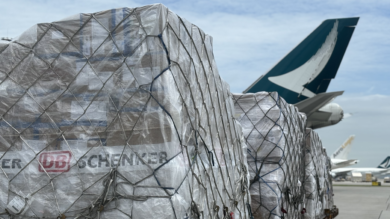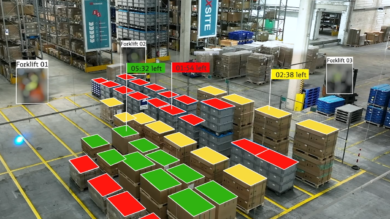Are the turbulent times over, or are we still in for a bumpy flight? Logistics Matters had the privilege of interviewing Asok Kumar, Head of Global Air Freight at DB Schenker, to discuss the outlook of the air freight market in 2023. What can we expect regarding demand, capacity development, and industry trends? Asok sheds light on the negative tailwinds that impacted the industry towards the end of 2022, rebalancing capacity and demand. Join us as we delve deeper into the implications of these developments and their potential effects on the air freight market.
In 2023, what can one expect from the global air freight business in terms of demand and capacity development and overall industry trends?
Asok Kumar: Without a doubt, 2023 will be a tough year. We already saw the negative tailwinds towards the third and fourth quarters of 2022, where overall consumer demand dropped. The capacity in the market concerning demand was starting to rebalance. So, with ample capacity in the market the rate levels began to drop as well.
As we come into 2023, this will unfortunately continue to be predominant. What I expect for this year is that we will have a very challenging first half of the year, where the negative impacts of the last quarter of 2022 will continue into this year.
Demand remains weak, but I’m optimistic that the year’s second half will be stronger. I do believe that the very high inventory levels, particularly in the US, will start to diminish and deplete. Therefore, inventory levels will come down, and the customers will start shipping again.
In 2021, we had an extreme peak season. In 2022, we had no peak season, basically. And as we get into the second half of 2023, I think we will have a normal peak season again, and we need to be prepared for that.
Are there ongoing impacts of COVID-19 over the last years, and do you foresee further ongoing challenges?
Asok Kumar: Labor shortages were a big part of the problem during the two COVID years. I believe this will continue. Finding good, skilled labor in the market is still a problem today.
The entire behavior of the market has fundamentally changed, for example, the way customers and the industry now deal with supply chains versus the pre-COVID environment. The attention and focus for many companies, be it from the CFOs or the CEOs of our customers, was not as heightened as now. When we talk about procurement, for example, logistics procurement, the finance organizations have gotten heavily involved, and we see a completely different way of buying, a different way of procurement, and I think that is here to stay. We need to be mindful and adapt and support accordingly.
What are you doing as DB Schenker Air Freight to cope with and master these uncertainties, ensuring you serve your customers best in this environment?
Asok Kumar: We take a mid to long-term view of things. In the short term, we see a situation where the market has declined, demand has dropped, and capacity’s abandoned rate levels have fallen. You might arguably say many of the solutions we put in place in the last two years, for example, our flight operations where capacity was tight were to better serve our customers. We introduced flight operations, which gave our customers our control capacity at stable market rates. One might argue that it’s no longer relevant, and I do not think so.
I think mid to long-term demand will be turned into the market capacity and may not get as tight as before. But nevertheless, the need for our own control capacity on certain key routes will still be relevant. The strategy we deployed flying into alternate airports like Rockford, for example, will also be relevant.
Our service from these alternate airports is extremely good, and we offer that alternative solution. And the last important point is, again, through COVID, customers have realized how damaging such a situation can be to them, something that was completely unanticipated, and it could happen again. And because of that concern, they are also looking for contingency plans and quickly adapting.
So, we not only serve the customers better today, but we have these alternative solutions and contingency plans that we can quickly pivot and support our customers accordingly.
Published: March 2023










